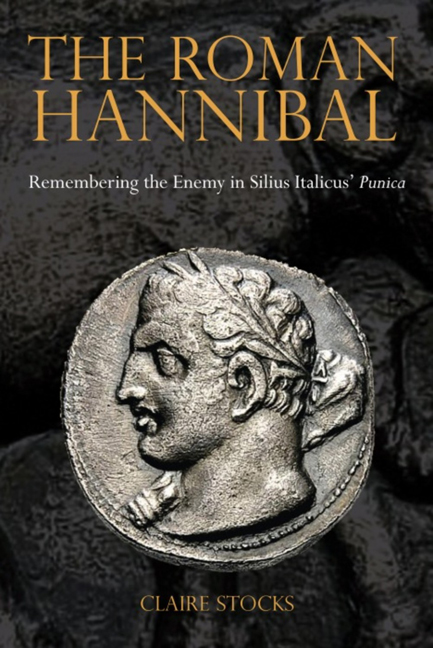Book contents
- Frontmatter
- Contents
- Acknowledgements
- Texts and Translations Used
- Introduction: Silius Italicus and the Roman Hannibal
- Chapter One The Roman Hannibal Defined
- Chapter Two Before Silius: The Creation of the Roman Hannibal
- Chapter Three Silius' Influences
- Chapter Four Epic Models
- Chapter Five Silius' Roman Hannibal
- Chapter Six Out of the Darkness and into the Light
- Chapter Seven Hannibal's Decline after Cannae: Separating Man from Myth
- Chapter Eight Imitators and Innovators
- Chapter Nine Band of Brothers
- Chapter Ten The ‘Lightning Bolts’ (Fulmina) of War
- Chapter Eleven The Man and his Myth: The Self-Defined Roman Hannibal
- Conclusion: The Crossing of the Worlds: The Move from Internal to External Narrative
- Bibliography
- General Index
- Index locorum
Chapter Ten - The ‘Lightning Bolts’ (Fulmina) of War
- Frontmatter
- Contents
- Acknowledgements
- Texts and Translations Used
- Introduction: Silius Italicus and the Roman Hannibal
- Chapter One The Roman Hannibal Defined
- Chapter Two Before Silius: The Creation of the Roman Hannibal
- Chapter Three Silius' Influences
- Chapter Four Epic Models
- Chapter Five Silius' Roman Hannibal
- Chapter Six Out of the Darkness and into the Light
- Chapter Seven Hannibal's Decline after Cannae: Separating Man from Myth
- Chapter Eight Imitators and Innovators
- Chapter Nine Band of Brothers
- Chapter Ten The ‘Lightning Bolts’ (Fulmina) of War
- Chapter Eleven The Man and his Myth: The Self-Defined Roman Hannibal
- Conclusion: The Crossing of the Worlds: The Move from Internal to External Narrative
- Bibliography
- General Index
- Index locorum
Summary
Hannibal and Scipio part I
ni talia sancis, quem tremis et cuius somnos formidine rumpis, Hannibal hic armatus adest.
If you do not swear these things, Then he who makes you tremble and bursts as a nightmare into your dreams, ‘Hannibal’, now stands here armed.
(Scipio Africanus, Pun.10.442–4)The representation of Hannibal and Scipio as equal combatants is made problematic by their placement in two different generations. Whilst Hannibal is a iuuenis in the first half of the epic (e.g. 1.641), Scipio is a boy (puer, 4.454); when Scipio is a man conquering Spain, Hannibal is a war-weary general who has won no major victory since Cannae. Yet Silius tackles this problem in part by having his Scipio and Hannibal encounter one another at Cannae – Hannibal's greatest military achievement – an encounter in which Scipio, despite his youth, is styled as worthy opponent to the Carthaginian. This potential duel thus provides an interpretation of what could have happened, had they met in battle at Zama, and invites us to consider the two as worthy foes for the remainder of the epic; twin thunderbolts of war.
In the heat of battle at Cannae Hannibal cuts a path of death and destruction that is only interrupted by the approach of Varro, Brutus, and Scipio. Scipio is the most pro-active, referred to first by the narrator (aderat terrore minaci/ Scipio, 9.412–13). His approach bears a hint of Lucan's Caesar,3 establishing his own credentials as a figure of epic, tying him to Silius’ Hannibal and illustrating the potential his dynamism has to both support and undermine the Republic. Though the narrator sees the parity between the two, it is Varro who catches Hannibal's attention. Living up to his reputation and Juno-inspired ira, Hannibal thunders and rages and prepares to deal death to the Roman (tum feruidus acrem/ ingentis clipei tonitru praenuntiat iram, 9.422–3), but is prevented by Scipio. Though it was Varro Hannibal sought to kill, he perceives Scipio to be the greater foe (9.430–3). The narrator accentuates this perception by describing the two men as the greatest warriors yet seen in battle (stabant educti diuersis orbis in oris,/ quantos non alias uidit concurrere tellus, 9.434–5) and equal combatants in war (Marte uiri dextraque pares, 9.436).
- Type
- Chapter
- Information
- The Roman HannibalRemembering the Enemy in Silius Italicus’ Punica, pp. 182 - 217Publisher: Liverpool University PressPrint publication year: 2014

